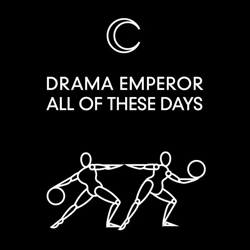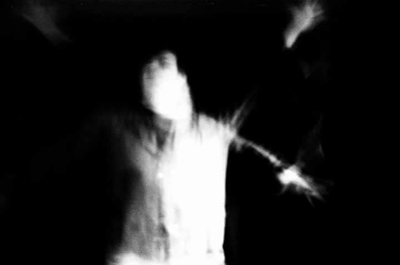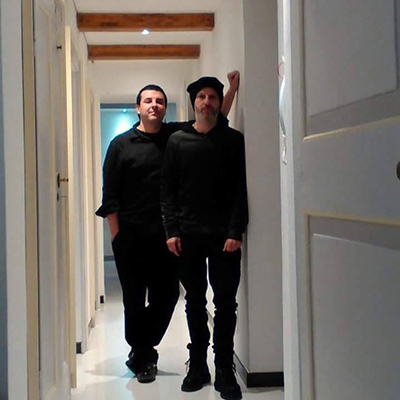Published by Alessandro Violante on April 16, 2017
 Michele Caserta and Cristiano Ballarini are Drama Emperor, an eclectic project raised up with Tortoise’ noise rock and post punk, which published their new album titled All of these days, released by Alienated Records, few months ago. Michele Caserta is also the man behind R7, an Italian promotion agency known for having booked classic and contemporary industrial bands and minimal synth projects.
Michele Caserta and Cristiano Ballarini are Drama Emperor, an eclectic project raised up with Tortoise’ noise rock and post punk, which published their new album titled All of these days, released by Alienated Records, few months ago. Michele Caserta is also the man behind R7, an Italian promotion agency known for having booked classic and contemporary industrial bands and minimal synth projects.
After having widely talked about their album shortly after its release, we’ve seen them live at Grotta Rossa in Rimini and we’ve talked with them, in order to know something more about them and their music. The interview began with a picture taken together with them.
Hi guys! It’s a pleasure to interview you. Do you want to tell us who Drama Emperor are?
Michele: I’m Caserta Michele and he’s Ballarini Cristiano. As written in the civil registry, the surname always comes first. We make a band so, when our music is covered on music newspapers, we make albums and we write: Caserta Michele and Ballarini Cristiano, as Rossi Vasco (Italian pop singer). Together with Ballarini Cristiano, guitar player, we gave shape to this band with another guy in 2009, but our monicker was At Last. We were three people and we played electro-wave music. Later on, the third guy left and me and Cristiano kept on making music together, becoming Drama Emperor, and releasing our sophomore album, made throughout six or seven years, followed by an EP made of five songs, then Paternoster in Betrieb, composed by eight songs, and our last album All of these days, released in September 2016. It has taken a lot of years for us to do something serious together, also because we were long-time friends, admiring each other. Then, that day came.
Why “Drama Emperor”?
Michele: The meaning of Drama Emperor is connected with the beginning of the Greek play. The Drama was the opening of the event. Emperor Jones is a grand opera. We’ve wanted to put together these two elements.
What can you tell us about All of these days? First of all, what does it mean? Does it have a particular meaning?
Michele: All of these days is made of many moments, many frames of mind and, above all, many lives, many realities, many vicissitudes, many visions, many steps.
Cristiano: It’s a very varied album, talking about what we live in the world surrounding us. We’ve written it in three years. We’ve had the time to focus on recording and on the songwriting process only few times, as Michele was working on other projects and I had moved in another city.
Michele: One year ago Ballarini Cristiano moved to Milan as he married my sister and impregnated her, so I became an uncle (laughs). Now he’s part of my family, and this is part of the history of Drama Emperor.
Sid Lamar of Schwefelgelb and ex-Keluar made the mastering of the album. How this collaboration was born? Does his sound have influenced yours in some way?
Michele: First of all, Sid is a friend and I’ve known him since some years because of my activity with my concerts booking company (R7). I organize concerts for foreign music projects, and Schwefelgelb were one of the bands playing here in Marche (an Italian region) in these years. We have been knowing him since or six years, and we esteem him as he’s a great musician and sound technician. He is young, but he already has a lot of experience, and I would like to say that’s the result of his studies in Germany, while working with recording studios and gears, something not everybody had the possibility to do. He’s done a very good work with our album.
I’ve tried to give him the stereo tracks of each instrument, having a very clean quality and a very good resolution. According to me, he hasn’t influenced our sound, as the result of his work wasn’t so different from what achieved by us. He made a very good mix, a wonderful EQ, and he has added that “colour” we were searching for. I’m very satisfied of that master, as it sound as what I wanted to achieve. I wouldn’t change anything about it, even a posteriori.
What’s your approach to songwriting?
It’s a mess (they answer together).
Cristiano: It depends, because sometimes a song starts with a guitar riff or with lyrics, sometimes with a “lalalalala” then becoming words, and then music added upon them. He (Michele), builds the drum rhythm and, later on, bass and synths are added.
Michele: For example, I would talk about The final song, the closing song of the album, made in one single day. To be more precise, it was composed in two hours, the morning of the day in which we had to start recording. Then, lyrics were added to it. Everything started with a synth line, an arpeggiator. I like analogic synths and I use them. We’ve built this sequence and, starting from it, we’ve created others, and so on. Then, during the afternoon, we added the lyrics, but the song has really been made in two hours, everything started spontaneously. Songwriting can be an immediate process, or can take some days. It’s important to have a clear idea about a sound. If so, you just have to build a song starting from it.
Cristiano was talking about the fact of having chosen the last song as your first single, something not very common.
Michele: Yes, it’s a straight to the point song, short, fast and a bit “easy-listening” song.
 It seems to me that the strength of the album is that each song has its own character, resulting in a really varied album.
It seems to me that the strength of the album is that each song has its own character, resulting in a really varied album.
Michele: This album can be considered a collection of Drama Emperor songs, which had been written during three years, so each song has been written in different situations, with different frames of mind and, then, with very different sounds…
Each song has its particular sound, such as Jerusalem. Given this, I would know what are your music (and not only) influences.
Cristiano: The album has several new wave sounds. We come from the ‘80s, so every artist being part of my music background belongs to new wave / dark music of those years.
Michele: I have a different background. I like, for example, Castellina Pasi. I like ballroom dancing, I wanted to add also something other…I like Righeira (laughs). I listen to a lot of jazz music.
Although having been influenced by new wave and “dark” bands, your album doesn’t sound as a copy of their classic albums, and this gives an added value to it.
Michele: If I wanted to do a copy of classic albums of the genre, I would have a Joy Division or Bauhaus cover band. As far as I’m concerned, Drama Emperor, although having these kinds of influences, don’t want to be a copy. There’s a common trait linking the songs of the new album. If I had to make an album having the same snare, the same guitar sounds, the same vocals of the classic albums, I simply wouldn’t do it, because I don’t listen to these “cover bands”.
At the same time, the risk of having a personal approach is that the listener could not easily recognize the trademarks expected in a “classic” album of the genre. Is it a problem for the sales?
Michele: According to me, some labels exist and are important in order to make a good album, easier to be sold and to be spread. There are bands who play more shows than us, having released an album being just a copy of something already done before. I hate this thing, I don’t want to be a part of this mechanism.
Cristiano: To be sincere, I don’t presume and I’ve never tried to have an original sound. We make what we’re able to make, I’ve always said this. I’ve started playing twenty years ago and I make it in a certain way. I write my songs as I’m able to do it, I don’t have to write something new, never listened before. Well, the only thing we try to do is to care about arrangements. Not all our songs are built around the verse – refrain – bridge and ending, maybe they’re songs not having any refrain or verse.
What do you think about the current Italian wav e scene?
e scene?
Michele: I think that nowadays there are bands capable of doing something good with their gear, meaning they’re capable of entering into a rehearsal studio and make good music.
Cristiano: There are some young bands that I know, making good music. I didn’t know Congedo, as well as European Ghost, who will be our support band during the concert at Circolo Dong. I’ve never listened to them, but I’m curious. There are several very interesting bands I don’t know yet.
Michele, you own and manage a booking agency called R7. Can you talk to us about it?
Michele: R7 is the result of the meeting between me and a Swiss friend of mine, Ali Salvioni. Currently, I manage the Italian part of the agency together with other collaborators, such as Daniele and Eli Felici. I’ve thought about making foreign musicians play in Italy, and I did it because theyare able to manage themselves better than Italian artists. This doesn’t mean I don’t work well with Italian ones, but it’s not the same thing. I follow darkwave, electro and electro-minimal music scenes, and I’m progressively moving to analogic synthesis and towards musicians using gears and synths. We’re organizing tours, we’re ending the one by Pankow. I like this collaboration with Pankow and Maurizio Fasolo, and I thank him for this. In april, Xeno & Oaklander will play, we still have two empty days. We don’t know where they could play in Milan. We’ll see.
Considering that, in this album, there are also instrumental songs, is there some difference in the songwriting process and in what you want to transmit when you write an instrumental song or a song having lyrics?
Michele: Above all, there’s a difference in the listening process of the song, in its vision. I consider this ethereal part of the instrumental as the beginning of something recalling the concept of the Drama, a curtain preceded by who’s playing. Bell, curtain, entrance. I consider the instrumental part of the song as an harmony upon something having to be begun. That’s the difference I find. I find that there are some instrumental songs that doesn’t need to have lyrics, that we like for what they are, not having a form nor a structure. The structure is an open structure, without verses and refrains.
Cristiano: It should be said that, when we compose instrumental songs, as happened with Step new in this last album, we haven’t been able to write lyrics for it, we’ve tried to arrange it as an instrumental song. I’ve always admired those bands who only make instrumental songs, succeeding in expressing themselves very well, as Mogwai do, which I like a lot, but I wouldn’t be able to do it. Maybe it’s a limit, but whoever does it, he is able to transmit emotions. Is this what you wanted to know?
Yes. I was interested in knowing your different point of view on the same argument.
Michele: We have different opinions about almost everything. Sometimes we argue, it’s normal.
It’s true. What about reviews and critics opinions?
Cristiano: Unexpectedly, the reviews were good, and I didn’t thought it, as I said above, our lives have changed. I moved to Milan and got married. We’ve thought about disbanding but, later on, these very good reviews gave us a bit of strength, then I convinced myself that I wanted to keep on making music, so I make sacrifices and keep on doing it. There was much fear, because we’ve only recorded for three years, we never played together for this long time. When we had to play again live, we had few time to prepare these shows, anyway it seems our first concert had a very good feedback, even if played “at home” and there were our supporters with us. Let’s see what we’ll happen now.
I’m very happy for this live interview with you
Michele: I’m proud of knowing you, and I’m very happy because, first of all, there’s a human relation, and this is an old school approach I like, it’s been very beautiful talking online about the topics we have touched. Thanks for the time you’ve dedicated to listening this album, and for having reviewed it.
From Caserta Michele and Ballarini Cristiano, Drama Emperor.

